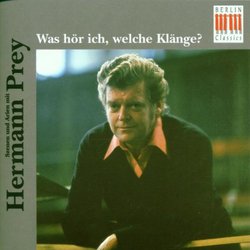| All Artists: Hermann Prey Title: What Does He Hear Members Wishing: 0 Total Copies: 0 Label: Berlin Classics Release Date: 1/19/1999 Genre: Classical Styles: Opera & Classical Vocal, Historical Periods, Baroque (c.1600-1750), Classical (c.1770-1830), Modern, 20th, & 21st Century, Romantic (c.1820-1910) Number of Discs: 3 SwapaCD Credits: 3 UPC: 782124937126 |
Search - Hermann Prey :: What Does He Hear
 | Hermann Prey What Does He Hear Genre: Classical
|
Larger Image |
CD Details |
CD ReviewsIn Memory of a great singer and a wonderfully human artist. Abel | Hong Kong | 02/09/2010 (5 out of 5 stars) "Nowadays, we that claim that there are more baritones than tenors.
Even so, can we name a 'pair' of outstanding 'tenor AND baritone' as outstanding as Fritz Wunderlich and Hermann Prey? Am afraid not. Even if Dietrich Fischer-Dieskau did legged up with the great Italian tenor Carlo Bergonzi in many productions and concert recordings, the collaboration of the great German tenor and baritone Wunderlich/Prey still remains unsurpassed. How Prey and Wunderlich fit into each other like a hand-in-glove has to be seen to be believed. They two singers were born in roughtly the same year (or barely one year apart), and after the death of Wunderlich, Prey published a memorial in 1981, recounting his collaboration, friendship and brother-like relationship with Wunderlich during the years from 1959 until September 1966. Like Wunderlich, Prey was a great Mozartian. In this 3 CD set issued in memory of Hermann Prey shortly after his death in 1998, we have three discs dedicating to the different aspects of Prey's artistry. The first CD mainly focused on Mozart - the three Da Ponte operas and Die Zauberfloete, operas in which Prey claimed unsurpassed artistry in the baritone roles. The second CD focused on two operas that were the calling cards of Prey, one being the famous Rossini buffa 'Il Barbiere di Seville', an opera, like Die Zauberfloete, that Prey collaborated with Wunderlich to unprecedented (and unsurpassed) success. The other half of the disc is an excerpted version from Schubert's great opera Alfonso und Estella, a recording of a performance rather late in Hermann Prey's star-studded career. The last disc is solely dedicated to J S Bach's two popular sacred cantatas that Prey recorded quite early in his career. People seem to over-look the artistic heights reached by Prey in searching for 'the' German baritonal standard. True that Prey was mostly shadowed by Dietrich Fischer-Dieskau in many spheres, but for the serious listener, one would NEVER over-look Prey's achievement or brush him aside for the sake of Fischer-Dieskau. To me at least, the 'older school' of singing as promulgated by Prey (and Wunderlich) would likely remain forever as the benchmark for the Germanic school of vocal standard." |

 Track Listings (16) - Disc #1
Track Listings (16) - Disc #1